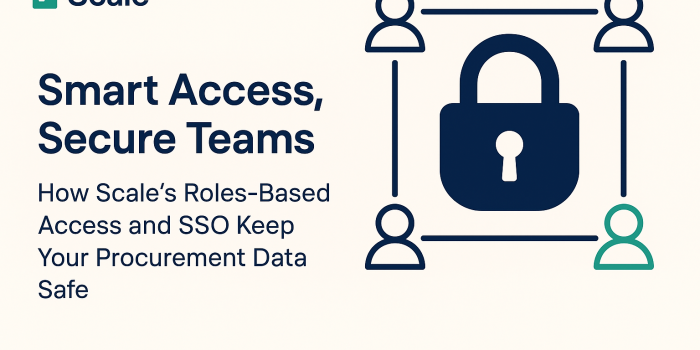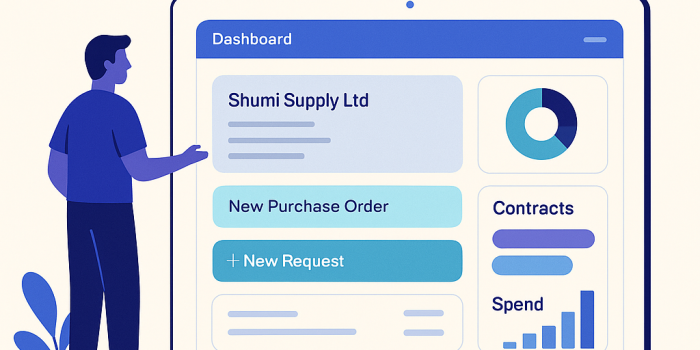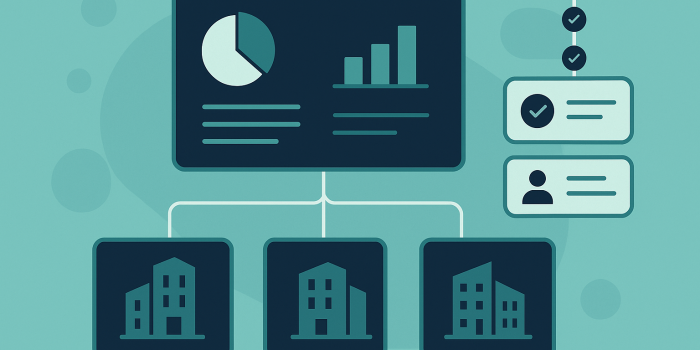e-Procurement in Kenya – Get started with an IFMIS Number
IFMIS provides the ability to digitally accept bid responses and in doing so, accelerate the adoption of e-procurement by public entities.
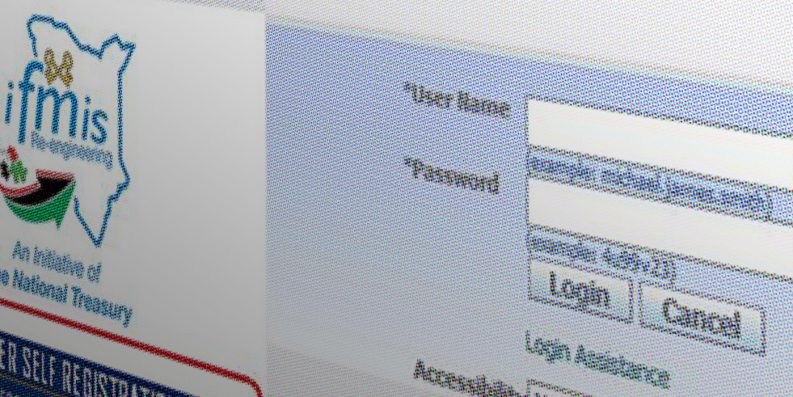
If you’ve worked with the Government before, then you must be aware of IFMIS e-procurement. For those not in the loop, IFMIS stands for Integrated Financial Management Information System. It is an automated system that is widely used for public financial management.
The IFMIS system was first launched in Kenya in 2003 and then later on 28th February 2011, the then Deputy Prime Minister and Minister for Finance Uhuru Kenyatta launched the IFMIS Re-engineering Strategic Plan (2011-2013).
In line with the Public Financial Management Act 2012 (Article 12), the re-engineered IFMIS has been implemented to connect all government ministries, agencies and departments to a core network for purposes of effecting a single public financial management system.
The system was deployed in response to the increased demands for greater transparency and accountability in the management of public finances. IFMIS is designed to improve systems for financial data recording, tracking and information management. It does this through interlinking the planning, budgeting, expenditure management and control, accounting audit and reporting departments.
Do Public Procuring Entities actually use IFMIS to procure?
With the onset of the Covid-19 pandemic, the number of public entities using IFMIS e-procurement for digital submissions has increased. Progressive county governments such as Makueni, Siaya and Kilifi have led in using this approach for most of their tenders.
Here’s one from the County Government of Siaya that provides both the Supplier Portal Negotiation Numbers together with the Tender Reference Numbers:
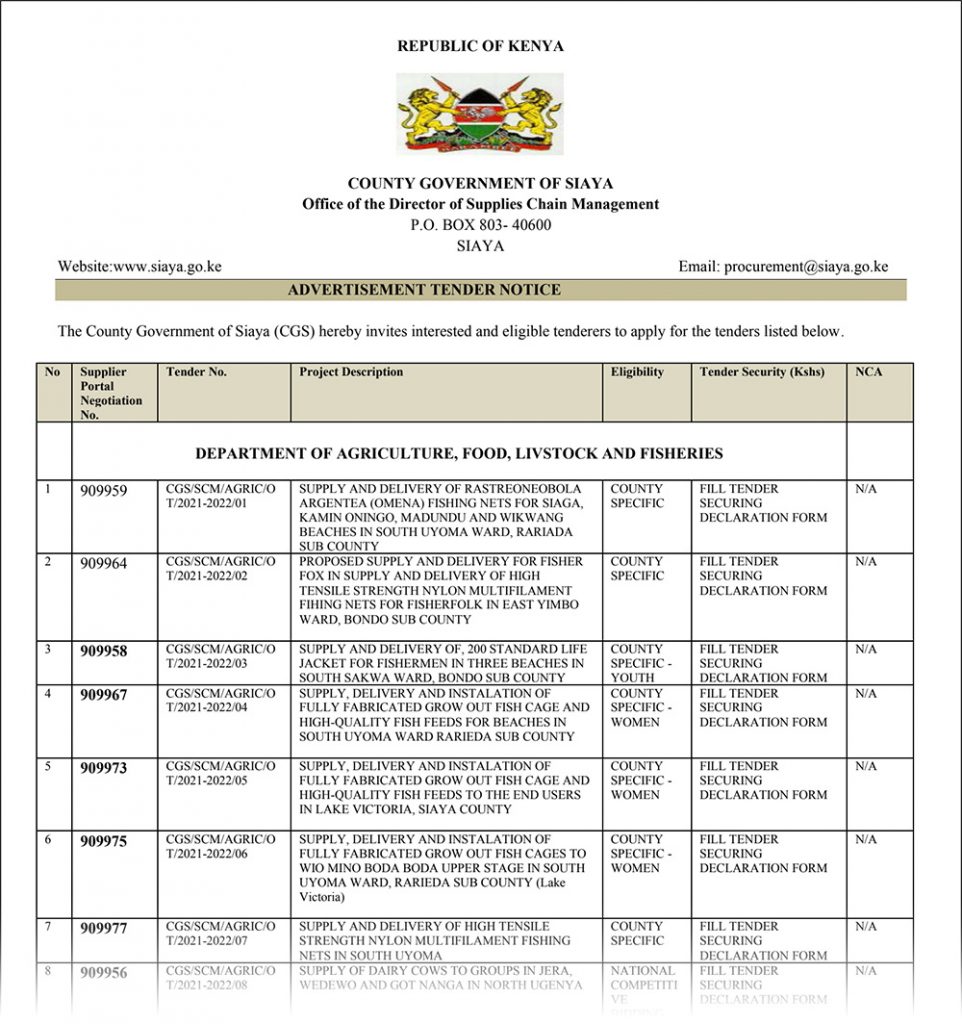
IFMIS for Kenya Government Suppliers
With the drive towards the adoption of e-procurement within the GoK, we’re sure you’ve come across the increasing number of tender notices that give reference to ‘IFMIS Negotiation’ numbers.
This is an indication that the procuring entity undertakes the Procure-to-Pay process through the IFMIS e-procurement platform. Therefore, if you are interested in submitting a bid response to any of the tenders in question, you are required to have signed up on IFMIS.
You can register on IFMIS as a supplier for a company or as an individual. All you will be required to do is to present documents for whichever entity you are registering for as follows:
- The KRA Pin for the business/individual
- Business/Company registration number
- Preferred Email Address (Company/Personal)
- Names of the Contact person
- Official Phone Number of the Contact person
Here is the official communication on how to get registered on IFMIS plus some additional self-service steps:
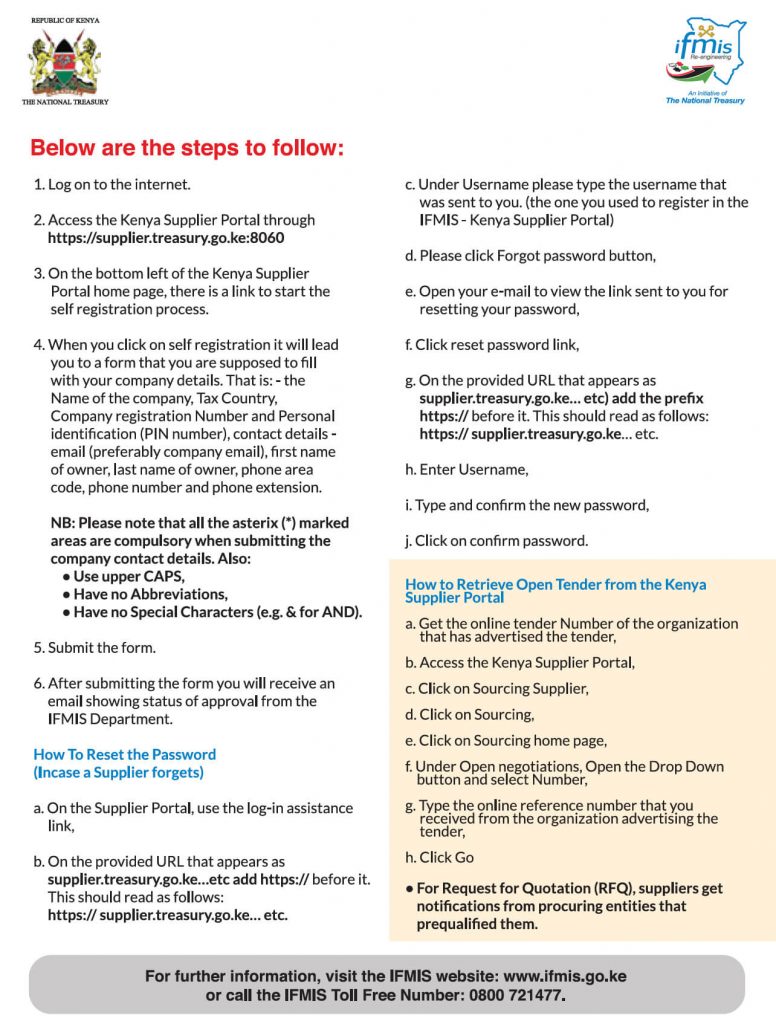
Once registered, you will be able to access the Kenya Supplier Portal section within IFMIS. The Kenya Supplier Portal is specifically designed to allow businesses that want to work with the government to do the following:
- Self-register online and get assigned an IFMIS Number for your business. This number is extremely important to most of the future business interactions you’ll have with GoK.
- Get access to participate in tenders either in the tendering stage only or through the entire e-procurement process. This is dependent on the procuring entity and how they have structured their procurement process.
- Keep track of the progress of tender/bid submissions throughout the tender evaluation lifecycle.
- Receive direct communication from the government when it’s relevant to your business and the public entities that you work with.
- Follow up on the status and progress of payments from the government
The opportunity for e-Procurement
Our solution, Scale, provides you with tools for managing all your tendering activities in one place. And nothing will make us happier than to see wider adoption of e-procurement tech by public procuring entities. IFMIS provides the ability to digitally accept bid responses and in doing so, accelerate the adoption of e-procurement by public entities.
We know many would be averse to the accountability, transparency, predictability and transparency that this will bring…but we remain hopeful. Our team is optimistic that in the future, IFMIS will be re-engineered to allow for 3rd party platforms to integrate. This will allow for richer solutions for businesses such as submission of tenders prepared & exported from Scale directly into IFMIS.
This is part of the problem that Scale solves for suppliers to the government. Our platform gives you the tools to digitally prepare your proposals and tender responses online.
This means you get to keep a secure digital record of all your bid submissions for future reference. It also works perfectly even with the current submission of physical/printed of tenders!
We know the government’s e-procurement tools come full circle and start accepting direct digital submissions. And when that happens, we’ll definitely be the first to integrate and make the experience seamless for you. How delightful will that be!
Bonus Info: Here’s what the law says about e-Tendering
The 2020 Public Procurement and Asset Disposal regulations have outlined the e-procurement process as follows:
- The candidates who are desirous of participating in e-procurement shall submit their bids in the standard formats issued by the Authority.
- The tenderers shall upload copies of all the relevant certificates and documents on the e-procurement system in support of their bids.
- The tenderers shall sign all statements, documents and certificates uploaded to take responsibility for their correctness and authenticity.
- Tenderers shall be allowed to submit modifications to bids or proposals or withdraw previously submitted bids or proposals electronically up to, but not after, the bid submission deadline.
- Receipt of modification or notice of withdrawal including the date and time shall be acknowledged electronically.
- A bid or proposal submitted online shall be scanned for malware by the system administrator before being uploaded and accepted into the online bid box.
- Where a scan causes a bid to be rejected, the tenderers shall be notified immediately.
- A procuring entity shall accept only those bids in electronic format received within the tender submission deadline.
- Receipt of electronic submissions, including the date and time, shall be acknowledged electronically.
- Proof of tender security as required by the procuring entity, where applicable, shall be scanned and uploaded along with the bid, and the original physical copy shall be submitted to the procuring entity so as to reach before the date of closing of the bids.
- Failure to submit the original physical copy of a tender security before the closing of the bid shall lead to the disqualification of the bid.
- A procuring entity shall not charge any fee for tender documents obtained electronically by candidates.
- In order to submit the bids electronically, candidates shall be required to secure a digital signature certificate from a certifying agency licensed by the Communications Authority of Kenya.
- The bids or proposals submitted online shall be signed electronically with a digital signature to establish the identity of the bidder submitting the bid or proposal online.
For now, you can search through hundreds of tenders that are available for you to apply from both the Government and the Private sector. Best of luck!





